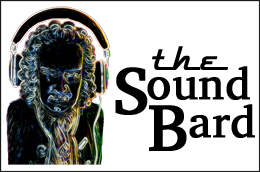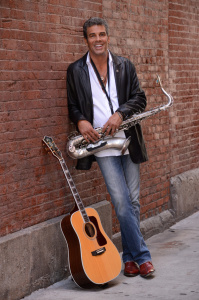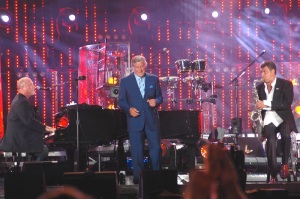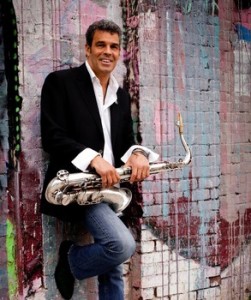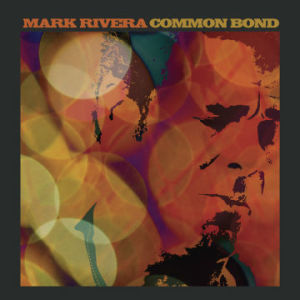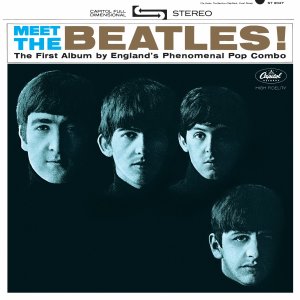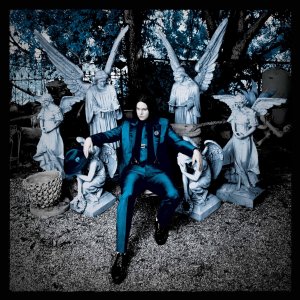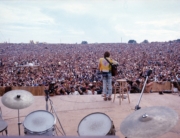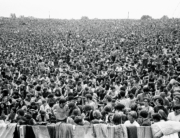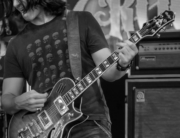BY MIKE METTLER — DECEMBER 10, 2014
When Mark Rivera isn’t splitting his time being Music Director for Ringo Starr or serving as a versatile multi-instrumentalist with Billy Joel (the latter for 32 years and counting), he’s doing what any good audiophile would — dropping the needle on some fine, fine wax. “The warmth of vinyl is like nothing else,” Rivera reports. “It really is. To me, it feels like it embraces you. It simply surrounds you.”
Earlier this year, Rivera — who’s responsible for the indelible sax lines on Peter Gabriel’s seminal “Sledgehammer” and has also played for the likes of John Lennon, Joe Walsh, Tony Bennett, Hall & Oates, and Foreigner — also found the time to put out his first solo album, Common Bond (Dynotone/Red River), and he’s patiently been overseeing having 1,000 copies of it pressed onto vinyl. “I couldn’t be more enthusiastic and more pleased about that,” he says.
Common Bond is uncommonly good. Besides showcasing his prowess on saxophone, flute, and keyboards, Bond also features Rivera’s soulful vocals, including a driving cover of Jimi Hendrix’s “Spanish Castle Magic” — which also finds pal Billy Joel trading white-hot Hammond B3 organ riffs with Rivera’s stabbing sax lines — and the swinging original “Money Money Money,” a finalist for 2014’s Coolest Song in the World on Little Steven’s Underground Garage.
Here, Rivera, 62, and I talk about Common Bond‘s core production values, vintage gear and favorite LPs, and the ways music resonates over one’s lifetime. Ok, fine, we admit it — we just can’t get enough of that vinyl stuff.
Mike Mettler: First, I have to say I’m glad to hear you’re as big a fan of vinyl as I am. And I’ll bet you’ll be glad to know that Sound & Vision used to be known as Stereo Review back in the day.
Mark Rivera: Oh, I remember Stereo Review very well, in fact. My father [Deider Rivera] used to subscribe to it back in the ’70s. He was one of the first ones on the block to have a stereo.
Mettler: Oh yeah? What did you have?
Rivera: We had a Marantz receiver and a Crown power amp. All separate components — and a Scott tuner back then, too. That’s going back a long ways.
Mettler: That’s good, vintage stuff.
Rivera: My father and I would talk about Stereo Review. He loved jazz, classical, and Latin music. We’d listen to Ed Beach [who hosted “Just Jazz” on WRVR 106.7 in New York from 1961-76], and we’d record all the sessions — all the guys I loved growing up, like Charlie Parker and [jazz tenor saxophonist] Ben Webster. He used to get out his Tandberg reel-to-reel and record stuff at slow speeds so he could get 4 hours on each side. It was great. I still have some of those reel-to-reels downstairs.
Mettler: Ahhh, very cool. I have two Akai reel-to-reel players in my downstairs listening room.
Rivera: Oh, nice! Nice.
Mettler: Reel-to-reel tape is still one of the best-sounding formats we ever had.
Rivera: Oh yeah! If you’re talking about sound quality — especially if you can get 7½ or 15 ips, then you’re really rocking.
Mettler: I totally agree. Vinyl must have been a big thing for you as a kid growing up in Brooklyn.
Rivera: Oh, 100 percent. Are you familiar with Grado Labs? John Grado and I are best friends. I’ve known him since I was 5 years old. It’s, what, 56 years later, and he and I are the best of friends. John and I go back a long time. I used to go to his uncle Joseph Grado’s place, the guy who started it, at Seventh Avenue between 46th and 47th. It’s a very unassuming building, a three-floor walkup. It’s still there. You’re familiar with his headphones, right?
Mettler: Oh yeah, Grado headphones are among the best on the market.
Rivera: I’m glad to hear you say that. I also grew up with Jimmy Iovine, the guy from Interscope who they gave like $2 billion to for Beats. I have no axe to grind with a friend — I happen to like Jimmy, and his success is wonderful and well-deserved — but those headphones suck! (laughs)
Mettler: I’m going to plead the fifth on that one. (both laugh) Tell me about the sound quality you were going for with Common Bond.
Rivera: My producer, Jimmy Bralower, he’s a master. And the reason my record sounds as good as it does is because of Jimmy’s flavor. He was originally a drum programmer. He worked almost exclusively with Nile Rodgers and Jim Steinman in the ’80s. All that great drum programming on Steve Winwood’s “Higher Love” — Jimmy’s the only one who knows where that thing starts. Nobody knows where the beat is until Stevie starts singing. But Jimmy, he so deserves the accolades for this record. More people should know about his work. He’s got great ears.
He sent me five mixes for this record. I was using my Grado headphones while I was recording the vocals. For “Spanish Castle Magic,” I was standing on the other side of the door where we had Charlie Drayton’s drums set up. I had that in my ears while I was singing at the top of my lungs, and Jimmy’s job was to get rid of all the extraneous noise between the words! (chuckles) He said, “Don’t you hear it? Charley’s drums aren’t in your vocals at all! I got rid of that rumble!” (laughs)
Mettler: So you cut a good bit of Common Bond live, with most everybody in the same room?
Rivera: A great deal of the tracks were done that way — and we’d later do some vocal overdubs, and I’d go back and do a lot of the horns. For the most part, the mixing and the real nitty-gritty was done in Jimmy’s basement. Jimmy’s got a full-blown studio downstairs. We also did a lot of it at Avatar Studios [in New York].
Mettler: Oh, I love Avatar. Such a great studio. Great sound.
Rivera: Love Avatar. And the old Power Station is where I did the horns for [Peter Gabriel’s] “Sledgehammer,” so that place has a little bit of history with me. We were in the smaller room of the two because, at the time and to this day, that was all I could afford.
Mettler: Well, you got a great sound on this album, that’s for sure. So tell me what the first record you got as a kid was.
Rivera: The first record I got — my aunt bought me Meet The Beatles. And the day she actually bought it was on February 9, 1964. I had only heard their stuff on the radio, and she knew they were going to be on The Ed Sullivan Show that night, so she got me the record. We went to E.J. Korvette’s, got the record, and I listened to it top to bottom. The song that stuck out in my brain the most was (sings), “It won’t be long, yeah!” That song killed me. It leapt out of the stereo, and then we got to see it that night.
I remember getting into 45s, but as far as albums, one of the first ones I remember falling in love with was The Young Rascals, Collections (1967). And I remember putting the needle down on [The Jimi Hendrix Experience’s] Are You Experienced. I have to say, 1967 was the greatest year, musically, of my life. I’ll give you five records: Are You Experienced, Cream’s Fresh Cream, The Young Rascals’ Collections, [Procul Harum’s] “Whiter Shade of Pale,” and — can we ever forget — that’s the year Sgt. Pepper came out.
Mettler: Ah yeah — on June 1, 1967.
Rivera: Yeah, you got it. Right now, in my studio, I’m looking at a poster of them. It was just an amazing time. I was 14, and my brain was still soaking up all of this inspiration. Those five records are seminal records. To me, when you put a Grado cartridge down on a piece of vinyl — and this might sound corny, but that initial thud you hear in the first groove, it reminds me of when you put your seatbelt on and you go for an E-ticket ride. You know you’re going to be in for an amazing audio experience. Sonically, nothing is as giving, and as round, and as warm as vinyl. Nothing.
Quite frankly, what the big record companies should do is get people hip to vinyl and they’ll sell, because all the people who originally bought it probably played them, scratched them, and ruined them. The record companies are focusing on a very small group of people. They’re still aiming at 17-to-21-year-olds. Jimmy always says they have their scope on 5 degrees of a 360-degree circle. Yeah, I’m older, but I will still buy records. There’s 355 degrees left of uncharted waters of people who have not been tapped.
When Jimmy and I did this record, we wanted to get people who might remember what it was like to hear vinyl. I say all the time that I wish I could get people to turn the CD over! (both laugh) I’m very serious! A guy from SiriusXM said this album reminded him of listening to [Traffic’s] John Barleycorn Must Die — a record that actually had a Side A and a Side B.
Mettler: Speaking of sides, Side 1 of your album ends with “Money Money Money,” which I’m glad is nominated to be the Coolest Song in the World for 2014.
Rivera: That’s right. And then the first thing that starts the second side is “Tell Me All the Things You Do” —
Mettler: Right, a Danny Kirwan song from Fleetwood Mac’s Kiln House (1970).
Rivera: Yeah, it’s that kind of thing we were aiming for.
Mettler: It’s been nice to see such a resurgence in vinyl. When Jack White’s Lazaretto debuted at #1 back in June, it sold 40,000 copies on vinyl alone, the best-selling new vinyl release in years.
Rivera: Geez, really? God bless him. And it happens to be a great record too.
Mettler: Jack totally understands the analog form and how to get that warm sound — to use that, ahem, “technical” term. But it’s true.
Rivera: It’s completely true, because it’s like describing cilantro. (both laugh) “What does it taste like? Dude, have you never eaten it?” The warmth of vinyl is like nothing else. It really is. To me, it feels like it embraces you. It simply surrounds you.
I remember my dad had a Garrard turntable — an old belt-drive, I think it was. My old man always had great stereo equipment, and this was back in ’68 or ’69. You’d lift the tonearm up, and as you let it down, you’d hit that outside, thick groove, and you’d hear that “kssssssshh.” By the time that needle dropped, I had to walk around the other side of a wall to get to it. It was a little crowded, but you’d feel that moment. And you know what? I’m not alone. If you talk to 100 Baby Boomers and ask them, “What do you remember about the needle dropping on a piece of vinyl,” I bet you 8 out of 10 would say that first moment. It was an anticipation, because you knew you were in for great sound.
Unfortunately, I also learned, after lending out records and getting them back with chewing gum on the fourth track or whatever (both laugh), how to use dish soap to clean them off and to get the dirt out of the grooves. If you can’t tell, I very much love music.
Mettler: Oh, I think I can tell just a little, Mark.
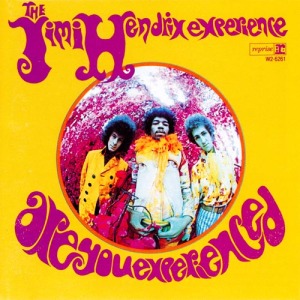 Rivera: You want to know the truth? People always ask me who my favorite jazz player was, but I always say Jeff Beck and Jimi Hendrix, because I’m not a jazz player — my style, and my interpretation, is more soulful rock. I’ve never professed to have studied jazz. You could play two notes from a Jimi Hendrix song — any two notes, even two drum fills — and I’ll say what record it’s from. It’s just one of those things totally seared into my brain, man. Why are there any great bands left? It’s because of great songs.
Rivera: You want to know the truth? People always ask me who my favorite jazz player was, but I always say Jeff Beck and Jimi Hendrix, because I’m not a jazz player — my style, and my interpretation, is more soulful rock. I’ve never professed to have studied jazz. You could play two notes from a Jimi Hendrix song — any two notes, even two drum fills — and I’ll say what record it’s from. It’s just one of those things totally seared into my brain, man. Why are there any great bands left? It’s because of great songs.
Mettler: So true. Ok, last thing for now, since it sounds like we’re going to have to do a listening session together at some point —
Rivera: Oh yeah, I’m gonna come over. I’d love to sit and chat with you and talk about records. That, to me, is one of the greatest things ever.
Mettler: We can totally make that happen. So to finish up, who are your favorite singers?
Rivera: To me, my favorite rock & roll voices are the ones I grew up listening to — Paul Rodgers, who’s truly an inspiration, Lou Gramm [formerly of Foreigner], and Stevie Winwood. Those are my three favorite rock & roll singers. I also grew up loving Wilson Pickett, Levi Stubbs from The Four Tops, and The Temptations. That’s what I grew up hearing as a kid and singing along to. That’s just the sound that I heard. As you grow up, you keep something inside like that that strikes a chord within you. That stuff is so far into my blood.
Tags: Akai, Avatar Studios, Ben Webster, Billy Joel, Charlie Parker, Common Bond, Crown, Garrard, Grado Labs, Higher Love, Jack White, Jimmy Bralower, Jimmy Iovine, LP, Marantz, Mark Rivera, Peter Gabriel, reel-to-reel, Ringo Starr, saxophone, Sledgehammer, Steve Winwood, Tandberg, The Beatles, vinyl